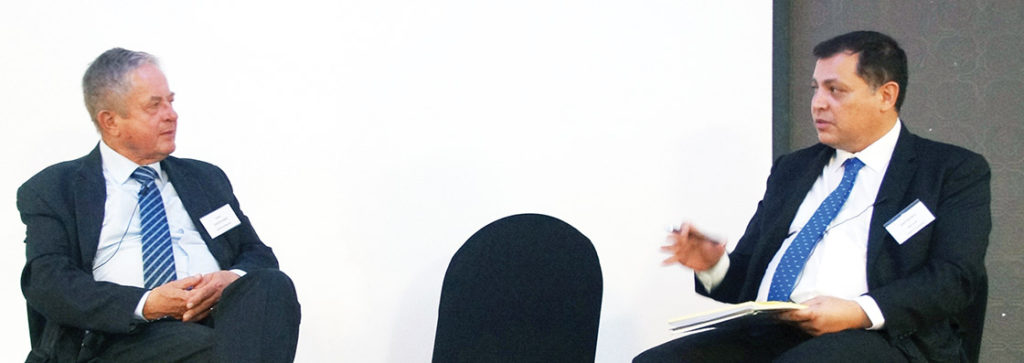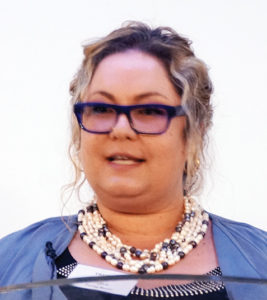


Retired Gauteng Division High Court Judge Eberhard Bertelsmann, discussing contingency fees with the President of the Law Society of the Northern Provinces, Anthony Millar, at the first Legal Cost Indaba on 7 October.
By Kgomotso Ramotsho
Retired Gauteng Local Division, Pretoria, Judge Eberhard Bertelsmann, said taxing masters are gatekeepers of fairness, between attorneys’ and their clients. They are there to see to it that clients are charged reasonably. Mr Bertelsmann was speaking at the first Legal Costs Indaba, on 7 October in Johannesburg.
Judge Bertelsmann said that many years ago, contingency fees were regarded as unacceptable, but in 1997 following a British example, the Contingency Fees Act 66 of 1997 was implemented. He explained that, the existence of the Contingency Fees Act was to facilitate access to justice. He added that the focus of the contingency fees in 1997, was to ensure that people who could not afford to prosecute cases, were given an opportunity to through positively minded practitioners, to enforce claims. However, Judge Bertelsmann said the question remained, whether that motivation of the Contingency Fees Act is still the same.
The President of Law Society of the Northern Provinces, Anthony Millar said contingency fees have been a burning issue for many years. Mr Millar posed a question to Judge Bertelsmann asking if lawyers are selling a commodity or selling a bespoke service?
Judge Bertelsmann responded by saying that he did not regard contingency fees as a commodity, but said it is closer to a bespoke service. He said contingency relates to the fact that the client is unable to pay. Therefore, there is a risk in the preparation of the case as there are expenses that need to be negotiated and experts who need to be consulted. He said, in his experience, most experts are prepared to wait to get paid at the end of a case.

Retired Gauteng Division High Court Judge Eberhard Bertelsmann was the keynote speaker at the first Legal Cost Indaba on 7 October.
Judge Bertelsmann pointed out his concerns, that a huge amount of money has been spent on matters that could have been settled on the first day. He gave an example of Road Accident Fund (RAF) matters where, in his opinion, the moment summons arrive at the RAF, the RAF should have done the assessment of the merits and assessments of the injuries and asked attorneys for a couple of weeks or months to complete all the assessments and not go to court.
He said it was unfortunate that the current cash flow problems experienced by the RAF started because someone decided to virtually oppose all matters.
Mr Millar asked, what influence does the defendants’ ability to pay, play in the contingency system? He said in an assessment of the risk the attorney will think before entering in agreement with the client and also consider the prospect that there will be no money at the end. Judge Bertelsmann answered the question by saying that the fact that the defendant cannot pay should not concern the judge.
Mr Millard asked Judge Bertelsmann to comment on how the RAF and other state entities, such as the Department of Health, have been seen as easy targets for attorneys, in order to commoditise litigation. Judge Bertelsmann answered by saying that it was tragic that the standard of the administration of institutions such as the RAF and Department of Health and legal services they are bound to employ is perceived to be less than effective. He stressed that the issues of contingency fees where the Department of Health is concerned, has to be addressed and that there is a huge number of contingency agreements relating to medical negligence.
Taxation: No tailor made solution
Taxing master at the Gauteng Local Division, Johannesburg, Trudie Zeelie, said there are no easy answers or tailor made solutions, when it comes to taxation. Ms Zeelie was speaking about the generality of taxing client’s costs and counsel’s fees.
Ms Zeelie said that, the application for a taxation date must be submitted electronically to the taxation clerk. She said the application must include the case number, the citation of the parties, the number of items on the bill and the date the dies was completed on. She added that there are taxation principles and that no bill of taxation should be taxed if these principles are not met.
Ms Zeelie stated the following principles –

Taxing Master at the Johannesburg High Court, Trudie Zeelie, was a guest speaker at the first Legal Cost Indaba on 7 October.
Ms Zeelie said, in the event of the taxation being unopposed, the attorney on record must send a letter to the taxing master, confirming that the matter is infact unopposed. She added that in the matter of a settlement, the attorney on record must also send a letter confirming the settlement. She also spoke about the appearance of the cost of a tax consultant at the Gauteng Local Division, she said cost consultant appear and present the bill of cost.
Ms Zeelie said in the event of an objection to a cost consultant presenting a bill of cost or opposing it, taxation must be postponed to enable the instructing attorney to appear at taxation. She went on to speak about the dress code when legal practitioners and consultant’s present cost bills, she said the presentation and taxation of bills of cost is the culmination of the civil legal process, she said it is expected of legal practitioners and consultants to dress accordingly. ‘It goes without saying, that it is unworthy of attorneys and consultants to present the bill, without being properly attired. In general a gentleman must at least wear a coat, a formal shirt and tie, and a lady should wear formal shoes and a jacket,’ she said.
Ms Zeelie also spoke about professionalism and ethics, she said that in the current economic climate, money has been an extremely emotive matter and that taxation can turn into screaming matches. She urged that legal practitioners provide taxing masters with copies of the cases that practitioners will use during taxation and also give the taxing master full judgment on the matter, to enable the taxing master to understand the matter that they are going to deal with.
Ms Zeelie said legal practitioners must also be in a position to briefly address the taxing master on the nature and the merits of the matter, she said practitioners do not have to read the particulars of the plea, but tell the taxing master what it is all about. She noted that it was important that legal practitioners not correct the cost bill during taxation, which they omitted to ask for in open court.
Ms Zeelie said should legal practitioners have a portion of their costs reserved, costs have to be specifically unreserved or practitioners do not have those costs. She said if counsel in an open court did not see fit to raise it with the presiding officer to tell the judge to disallow the affidavit, the taxing master has no power to correct the bill. She added that the taxing master is empowered to interpret the judge’s order and give effect. ‘A taxing master can only work with what you give them,’ she added.
Ms Zeelie said between party and party, the court order does not make provision for the costs of more than one counsel, the practitioner cannot have the costs of more than one counsel. She added that the taxing master has no discretion on such a matter. She said that on liquidation matters, if a legal practitioner does not take an order that does not specifically deal with costs, the practitioner does not have those costs.
Ms Zeelie added that when a taxing master is taking on a review, the legal practitioner must attach the taxing master copy of the marked bill, to the application. She said even when it is not stipulated in r 48 of the Uniform Rules of the High Courts, attaching the copy of the taxing masters marked bill assists the taxing master and will enable the taxing master to deal with the review sensibly and timeously.
Ms Zeelie said in recent years, much has been said about counsel’s fees. She added that there is a debate regarding the commercial site of the practice to be balanced with the duty of care and service to the taxing master at the Johannesburg High Court. She stated that access to justice turns to be severely restricted because of astronomical legal fees being charged. Ms Zeelie said it would be helpful if counsel were to specify in their invoice in detail the professional services they have rendered. She said it would help in determination on both reasonableness and fairness of counsel’s charges.
Kgomotso Ramotsho Cert Journ (Boston) Cert Photography (Vega) is the news reporter at De Rebus.
This article was first published in De Rebus in 2016 (Dec) DR 15.